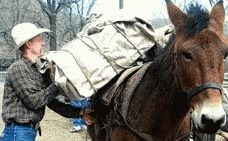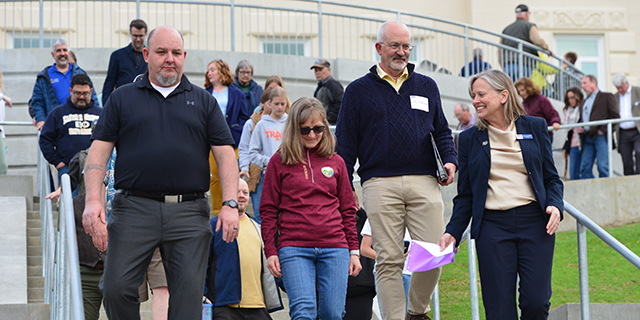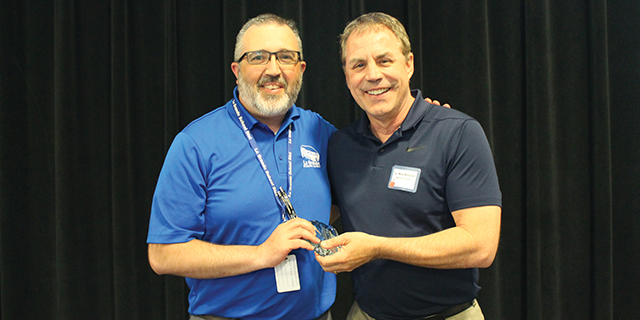PACKIN’ THE ‘CAPS: CLASS TO TEACH HORSE, MULE PACKING
Published 12:00 am Monday, March 26, 2007

- LOADING UP: Jeff Artley demonstrates how to pack a mule. Artley and his wife, Sara, are the managers of Union-based Moss Springs Packing. (The Observer/DICK MASON).
– Dick Mason
– The Observer
Jeff Artley, a professional outfitter who works in the Eagle Cap Wilderness, is worried about what he is seeing.
To be more precise, he’s worried about what he is not seeing.
The outfitter believes he is observing fewer people horse and mule packing in the Eagle Caps than in years past.
The reason is not lack of interest or desire but an absence of knowledge, Artley believes. Fewer people know about the basics of taking pack trips into the forest because the know-how is not being passed on by families as it once was, he said.
Artley and his wife, Sara, managers of Union-based Moss Springs Packing, are stepping forward to bridge the gap.
The Artleys are set to teach a new Blue Mountain Community College class in La Grande on horse and mule packing. The four-session class begins April 3.
One reason the Artleys will teach the class is they believe it is critical that the number of people horse and mule packing in the Eagle Caps
increases. A rise in mule and horse packing would make it easier for the U.S. Forest Service to get more funding for trail maintenance in the Eagle Caps, Artley said.
Trail maintenance is more critical for horse and mule packers than for backpackers.
"Hikers can walk around fallen trees. It is harder to do this with horses and mules,” he said.
He emphasized that he is happy with the support the Forest Service is giving mule and horse packers in the Eagle Caps.
Forest Service regulations are among the things the Artleys will discuss during their class. These include restrictions in wilderness areas where no trace camping rules are in effect. People in such wilderness areas cannot camp within a quarter mile of a lake, cannot be with a party of more than 12 people with 18 animals, must make sure their horses and mules do not wander at night and damage habitat and much more. Regulations are less restrictive on National Forest land.
Students will also learn which horses are best to use for packing.
Packers should also look for horses who are relatively short, have short backs and are stocky.
"You don’t want a fined-boned horse who is tall,” she added.
The Artleys believe that horses enjoy going on pack trips, especially if it is a new experience.
"It allows them to use a part of their brain they haven’t used before,” Jeff Artley said.
All mules are generally good for packing because they have been bred as a work animal. Mules tend to be even-tempered and have the right type of build for packing.
People venturing into the Eagle Caps on pack trips should not weigh themselves down with feed for the mules and horses because there is plenty of vegetation for them to eat along the way.
"The Eagle Caps are lush. There is no shortage of grass,” Jeff Artley said.
Stock feed is one of the many unnecessary things mule and horse packers bring on trips. They also often bring too much clothing and food and unnecessary items like tents. Sara Artley said that tents are not necessary in the Eagle Caps since a tarp will usually provide all the shelter needed from late spring through the summer.
Packing only necessities will allow a party to extend its trip into the wilderness by several days.
The Artleys believe there is no better way to see the Eagle Caps than on a horseback.
"I tell people I don’t hike. That is is why God created horses,” Sara Artley said.
The reasons the Artleys prefer packing to backpacking are many. Jeff Artley noted that hikers usually have their heads down looking at the terrain.
"You don’t hike with your head up. When hiking, you stop to look during breaks,” he said. "When you are packing, you enjoy everything in between.”
Another plus is that people on horses are usually about four feet off the ground so they have a better vantage point than backpackers.
"You see so much more,” Sara Artley said.
The Artleys’ class will meet from 6 to 8 p.m. April 3 and 5 at BMCC’s La Grande office, 1901 Adams Ave. On April 7 and 14 the class will meet at the Union County Fairgrounds from 8 a.m. to noon.
No experience is necessary to enroll. Cost for the class is $120.
To register call the Artleys at 1-888-420-7855 or Blue Mountain Community College’s Union County center at 663-1378.





